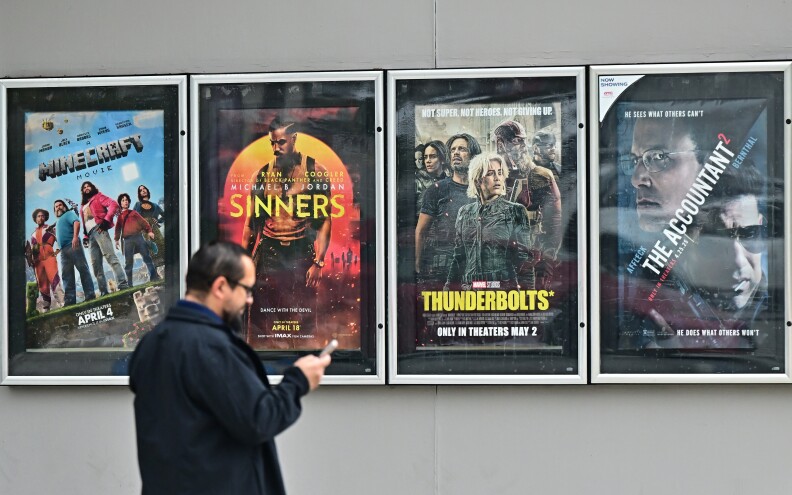Hollywood Blockbusters Face Potential 100% Tariffs: What This Means for the Industry

As theater attendance wanes, box office revenues become increasingly volatile, and Hollywood continues to shift productions elsewhere, the film industry could be confronting yet another challenge.
President Donald Trump announced In a posting to Truth Social on Sunday, that “any and all Movies coming into our Country that are produced in Foreign Lands” may soon be subject to 100% tariffs.
Trump cited recent economic downturns to the U.S. film industry and incentive programs that encourage filming abroad as reasons for the tariffs.
In A Day's daily radio broadcast, AirTalk , Reuters' U.S. entertainment business correspondent, Dawn Chmielewski , and Kevin Klowden An executive director at the Milken Institute of Finance assisted in elucidating what the recent tariff announcement might imply for California’s film sector and the lingering uncertainties surrounding it.
What does it mean to be produced in a foreign land?
The criteria for what constitutes a "film produced in foreign lands" remains ambiguous, however, it might include movies such as this year's summer blockbuster. A MineCraft Movie could be subject to tariffs, as part of its filming took place in New Zealand.
“Do we mean a production that is produced by a foreign company? Do we mean something that is filmed overseas?” asked Klowden. “Is it going to affect the entire production? Is it a tariff on the percentage that's filmed overseas?”
Some of this year’s most anticipated movies, such as the newest installment of Mission Impossible , the third Avatar movie, and Marvel’s latest Avengers film, were all shot outside the U.S., according to Chmielewski.
Chmielewski said it's unclear how tariffs would be assessed. Would it affect consumers buying tickets? Or studios paying for doing production abroad?
“ One studio exec I spoke to compared film production to cars. The parts are made elsewhere, but assembled here in the U.S.,” Chmielewski said.
Will this fix Hollywood’s problems?
The decline in Hollywood's economy began several years back, largely driven by the rise of streaming services. This trend was further exacerbated by the pandemic-induced closures and interruptions caused by strikes affecting productions.
As per Chmielewski, Hollywood’s movie and TV production has dropped over 40% in the past ten years.
"Tariffs could potentially lead to bringing production back to the United States; however, they may also hinder our capacity to fund or market these productions internationally. This could ultimately result in an even smaller volume of content being produced," explained Klowden.
Producing a film in Los Angeles comes with high costs.
Several recent expenses can be linked to the new rate hikes agreed upon by SAG-AFTRA and the Writers Guild, according to Chmielewski. However, the exodus of productions has been a concern for quite some time now, as many shows have shifted their filming locations to places like Atlanta, Toronto, and elsewhere.
Despite Governor Gavin Newsom of California’s efforts, proposed doubling Regarding the film tax credit and the expansion of qualifying films, Hollywood finds it difficult to match the incentives offered abroad.
"Producers inform me that they genuinely wish to create films in California; however, the financial aspects simply do not add up," stated Chmielewski.
Hollywood's dependence on international ticket sales
Despite being primarily produced in the U.S., most movies depend significantly on international markets for their earnings.
A MineCraft Movie added $150 million to its overall gross just at the international box office.
“ More than half of the studio's revenue comes from overseas box office, overseas streaming, overseas releases,” Klowden said.
He said retaliatory tariffs would affect how films are exported.
“ This summer is filled with high profile films that are also getting distribution in China, which is another market that sought to restrict film imports from Hollywood,” said Chmielewski.
And what about streaming?
“ A company like Netflix, much of its audience is outside of the U.S., and the majority of its production now is taking place outside of the U.S.,” said Chmielewski.
It remains uncertain how streaming services will be impacted and if tariffs will be imposed in the end.
However, for cinema enthusiasts worried about this year’s movies, Chmielewski stated that the outlook seems positive.
"She mentioned that the industry remains hopeful for a robust summer season for the rest of the year," he stated.

No comments